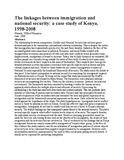| dc.description.abstract | The relationship between immigration, Conflict and National Security has not been given detailed analysis in the mainstream international relations scholarship. This is despite the reality that immigration has exponentially grown over the past three decades. Indeed in the face of the increased global interconnections in political, Economic and social fields coupled with transportation revolution and presence of inter and intra state conflicts which generates mass displacements, immigration is bound to increase. Today, due to these dynamics an estimated 200 million people are currently living outside the states of their birth.
Certainly such mass cross border movements do have impacts in the areas of destination. Their impacts have been given detailed attention in other disciplines concerned with specific aspects such as labour markets, cultural impacts and such. However these studies do not connect immigration to issues of National Security especially the broadened framework of security.
The study enters the debate at this point. It has linked immigration to national security by examining the immigrants' impacts on National security in Kenya. To bring out the impact the study has employed the fruitful framework of security developed by Barry Buzan. The framework conceptualizes national security as encompassing five sectors. These are the military, economic, political, societal and environment. The framework has been enriched by locating it within the human security approach which allows for multiple objects and referents of security.
Concerning the methodology, the study has used both interviews and content analysis. The two methods have assisted in collecting of primary and secondary data. Primary data has principally focused on Kenya's experiences while secondary data has examined the local and global experiences on immigration and the theoretical/conceptual arguments on the same. Data collected have been tested against the hypotheses of the study. The study hypotheses are: Immigrants lead to conflict and are a threat to national security in Kenya; Kenya has effective legal and policy responses to immigration; Immigrants do not lead to conflict and thus are not a threatto Kenya's national security.
The study's findings are that immigrant's poses threat to the national security. They have sectoral specific impacts which affect various levels (objects) of security. The impacts threaten the individual, society, environment and the state. However sweeping generalities cannot be made for there are intervening factors such as the identity of the immigrants, the causes of their emigration and the activities they are involved in.
This is evidenced by the findings that in Kenya immigrants' threats are mainly connected to immigrants of Somali ethnic group. In the face of this evidence the study makes a case for securitization of immigration policies if various objects of security are to be cushioned from negative impacts linked by to immigrants. However such securitization should be underpinned by the need to filter out persons posing security threats. It should not be a ground for promoting xenophobia. | en_US |

